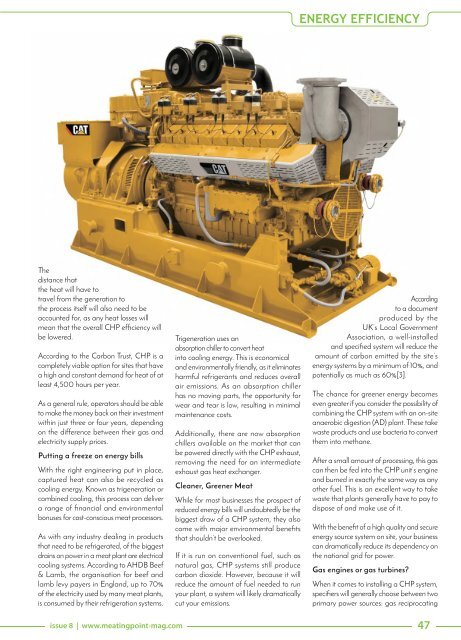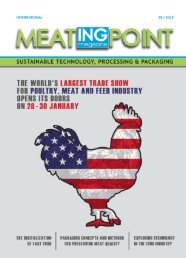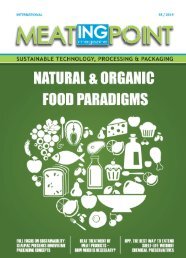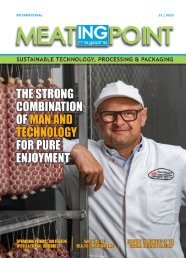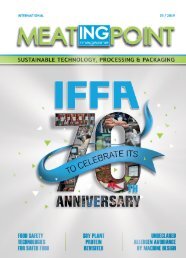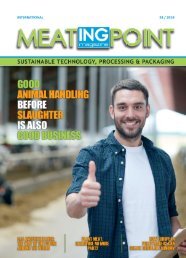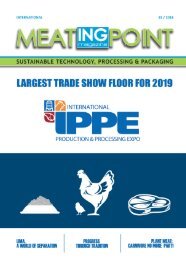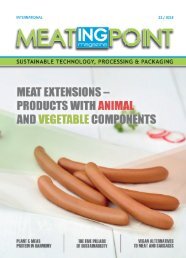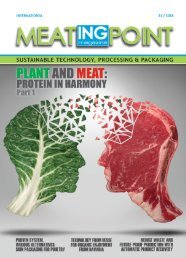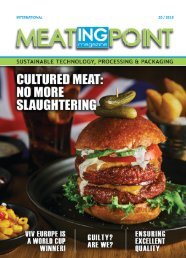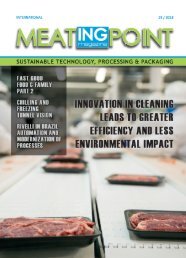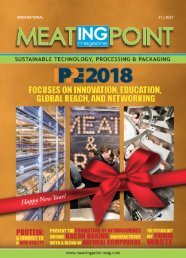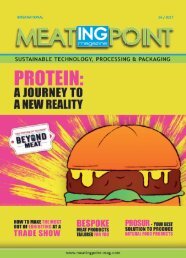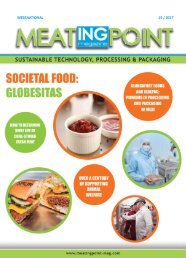MEATing POINT Magazine: #08/ 2016
Create successful ePaper yourself
Turn your PDF publications into a flip-book with our unique Google optimized e-Paper software.
ENERGY EFFICIENCY<br />
The<br />
distance that<br />
the heat will have to<br />
travel from the generation to<br />
the process itself will also need to be<br />
accounted for, as any heat losses will<br />
mean that the overall CHP efficiency will<br />
be lowered.<br />
According to the Carbon Trust, CHP is a<br />
completely viable option for sites that have<br />
a high and constant demand for heat of at<br />
least 4,500 hours per year.<br />
As a general rule, operators should be able<br />
to make the money back on their investment<br />
within just three or four years, depending<br />
on the difference between their gas and<br />
electricity supply prices.<br />
Putting a freeze on energy bills<br />
With the right engineering put in place,<br />
captured heat can also be recycled as<br />
cooling energy. Known as trigeneration or<br />
combined cooling, this process can deliver<br />
a range of financial and environmental<br />
bonuses for cost-conscious meat processors.<br />
As with any industry dealing in products<br />
that need to be refrigerated, of the biggest<br />
drains on power in a meat plant are electrical<br />
cooling systems. According to AHDB Beef<br />
& Lamb, the organisation for beef and<br />
lamb levy payers in England, up to 70%<br />
of the electricity used by many meat plants,<br />
is consumed by their refrigeration systems.<br />
Trigeneration uses an<br />
absorption chiller to convert heat<br />
into cooling energy. This is economical<br />
and environmentally friendly, as it eliminates<br />
harmful refrigerants and reduces overall<br />
air emissions. As an absorption chiller<br />
has no moving parts, the opportunity for<br />
wear and tear is low, resulting in minimal<br />
maintenance costs.<br />
Additionally, there are now absorption<br />
chillers available on the market that can<br />
be powered directly with the CHP exhaust,<br />
removing the need for an intermediate<br />
exhaust gas heat exchanger.<br />
Cleaner, Greener Meat<br />
While for most businesses the prospect of<br />
reduced energy bills will undoubtedly be the<br />
biggest draw of a CHP system, they also<br />
come with major environmental benefits<br />
that shouldn’t be overlooked.<br />
If it is run on conventional fuel, such as<br />
natural gas, CHP systems still produce<br />
carbon dioxide. However, because it will<br />
reduce the amount of fuel needed to run<br />
your plant, a system will likely dramatically<br />
cut your emissions.<br />
According<br />
to a document<br />
produced by the<br />
UK’s Local Government<br />
Association, a well-installed<br />
and specified system will reduce the<br />
amount of carbon emitted by the site’s<br />
energy systems by a minimum of 10%, and<br />
potentially as much as 60%[3].<br />
The chance for greener energy becomes<br />
even greater if you consider the possibility of<br />
combining the CHP system with an on-site<br />
anaerobic digestion (AD) plant. These take<br />
waste products and use bacteria to convert<br />
them into methane.<br />
After a small amount of processing, this gas<br />
can then be fed into the CHP unit’s engine<br />
and burned in exactly the same way as any<br />
other fuel. This is an excellent way to take<br />
waste that plants generally have to pay to<br />
dispose of and make use of it.<br />
With the benefit of a high quality and secure<br />
energy source system on site, your business<br />
can dramatically reduce its dependency on<br />
the national grid for power.<br />
Gas engines or gas turbines?<br />
When it comes to installing a CHP system,<br />
specifiers will generally choose between two<br />
primary power sources: gas reciprocating<br />
issue 8 | www.meatingpoint-mag.com<br />
47


